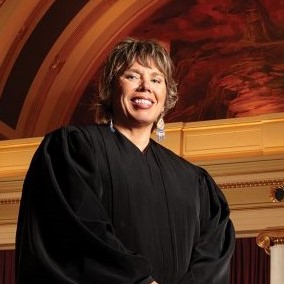The Mitchell Hamline Law Review’s annual legal symposium will bring together leaders at the intersection of health care, policy, agriculture, public service, and the law to examine the unique issues shaping rural communities. The symposium, titled “Legal Frontiers: Challenges and Opportunities in the Rural Midwest,” will take place on Friday, Oct. 3.
For Vol. 52 Editor-in-Chief Taylor Anderson, the symposium is an event that holds special significance for the Law Review and the Mitchell Hamline community. She said, “For more than 50 years, the Law Review has advanced meaningful legal scholarship, and the Legal Frontiers symposium continues that tradition. This event reaffirms Mitchell Hamline’s commitment to making the law and legal education more accessible and inclusive for all.
“We are especially proud to bring together a lineup of speakers whose voices span academia, practice, advocacy, and public service, and we look forward to a robust and meaningful conversation on the issues shaping rural America and the ways the legal community can engage with them.”

Associate Jusitce Anne McKeig ’92
Serving as the symposium’s keynote will be Justice Anne McKeig ’92, associate justice of the Minnesota Supreme Court. A descendant of the White Earth Nation, Justice McKeig was the first Native American appointed to the Minnesota Supreme Court, as well as the first Native American woman ever named to any state supreme court. She previously served as the presiding judge in family court in Hennepin County, Minn., and a former assistant Hennepin County attorney specializing in cases that fell under the provisions of the Indian Child Welfare Act. Justice McKeig is also a member of the American Law Institute, board member for the National Council of Juvenile and Family Court Judges Association, trustee for the College of St. Catherine, adjunct professor, and national advisor on issues related to child welfare, Tribal sovereignty and relations, intimate partner violence, and juvenile and family law. Having grown up in a rural community in northern Minnesota, Justice McKeig brings invaluable lived experience and deep legal insight to this important conversation on the rural Midwest.
In addition to a keynote address, the symposium will feature three expert panels addressing how law intersects with health care, agriculture, and access to justice in rural communities.
The first panel, “Legal Dimensions of Rural Health Care,” will be moderated by Network for Public Health Law’s Director of Climate and Health Jill Krueger and will feature Sue Grafstrom, board chair for the Center for Rural Policy and Development; Carrie Henning-Smith, co-director for the Rural Health Research Center at the University of Minnesota School of Public Health; Alyssa Meller, chief operating officer at National Rural Health Resource Center; and Meighan Parker, assistant professor at University of Georgia School of Law.
The second panel, “Agriculture and the Law in Rural Communities,” will be moderated by Mitchell Hamline student Sigrid Jewett, symposium editor for the Mitchell Hamline Law Review Vol. 52, and will feature Kathryn Draeger, professor and statewide director of regional sustainable development partnerships at the University of Minnesota; Elizabeth Odette, assistant attorney general for Minnesota and antitrust task force chair for the National Association of Attorneys General; and Minnesota State Senator Aric Putnam, chair of the Minnesota Senate Agriculture Committee.
The final panel, “Access to Justice in the Rural Midwest,” will be moderated by Mitchell Hamline Professor Kim Vu-Dinh, director for the Center for Law and Business, and will feature Rachel Armstrong, founder and executive director of Farm Commons; Sarah Brenes, executive director of the Binger Center for New Americans at the University of Minnesota Law School; and Layne Sutherland, chief public defender for Minnesota’s Ninth Judicial District.
The symposium will be held on Friday, Oct. 3, 8 am–2:30 pm in the Mitchell Hamline auditorium and online. In-person attendees will be provided with lunch, and four CLE credits are available.
Members of the public and the Mitchell Hamline community who are interested in this important topic are welcome and encouraged to attend. Those who wish to participate can learn more about the symposium or register online.
